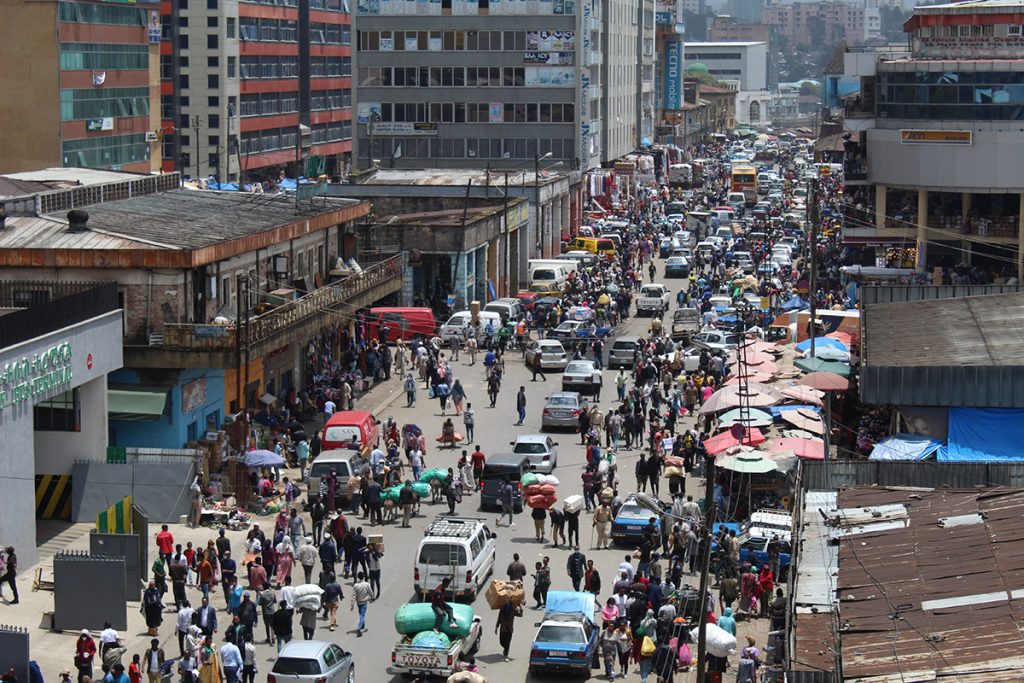Millions within Ethiopia have left their homes due to conflict, placing a strain on Ethiopian cities to support them. The situation in these already overextended cities calls for the power of international cooperation to support positive change and resilience. The Hague Academy has partnered with the Ethiopian Association of Cities (ECA) to strengthen the capacity of city governments to ensure service provision to IDPs.

For years now, cities have been at the centre of growth in Ethiopia, but with a yearly urbanisation rate of nearly 5 per cent, cities are increasingly facing the strain of unprecedented population growth. The towns around Addis Ababa, for example, have some of the highest growth rates in the country. This places the capital region under growth that outpaces service provision and creates inequality traps.
Still, growing urbanisation is only one of the issues they face. City governments have dealt with urban violence, outbreaks of ethnic or communal armed conflict, socio-political unrest, public health crises, floods, droughts, and fires – and not to mention the economic disruptions all such events bring.
It is in this context that the Ethiopian Cities Association (ECA) was first created, aiming to encourage cooperation and capacity-building between Ethiopian cities and international networks. Since its start in 2009, the alliance has grown to 86 cities that work together to improve the living condition of Ethiopia’s urban population.
The Outbreak of Conflict
The Tigray War flared in the north of Ethiopia between 2020 and 2022. As a result, millions of people fled their homes. As Andualem Tenaw Habtie, Director General of the ECA, explained to us: “The conflict in the north accounted for most of the displacements recorded in Ethiopia in 2021, but violence in Oromia and Benishangul regions also triggered a significant number”.
While the ethnic and nationalist conflict arose in the north of the country, renewed tensions between regional security forces and non-state armed groups intensified elsewhere. These tensions, mostly linked to land disputes and competition over resources, also sparked deadly clashes that forced people from their homes.
“Conflict and violence triggered more than 5.1 million new displacements in Ethiopia in 2022, three times the number in 2020 and the highest annual figure ever recorded for a single country”.
A Humanitarian Crisis
Now, millions of internally displaced persons (IDPs) find themselves in vulnerable positions in cities. They often lack “basic services, housing, land, property, access to documentation, equal access to the justice system, and due to some policy practices, restrictions on their freedom of movement.” Andualem continues: “The humanitarian situation remains dire.”
Building Support Networks
As Ethiopia continues to grapple with the challenges of internal displacement, the efforts of local governments and organisations like the ECA play a crucial role in addressing the needs of IDPs. By fostering partnerships, developing inclusive policies, and strengthening their capacity, cities can strive towards social cohesion and resilience. However, the scale and complexity of the IDP crisis call for continued collaboration, support, and innovative approaches to ensure the well-being and basic rights of displaced populations in Ethiopia. Local governments face the brunt of responsibility in the current crisis. As Andualem explains, “The ECA strives to address such problems, but it has limited resources to intervene”.
Still, with its network of cities, the ECA seeks to encourage collaboration with international organisations. The Hague Academy has sought to support the ECA with capacity strengthening through the Orange Knowledge Programme (OKP), funded by the Dutch Ministry of Foreign Affairs.
This programme targets the staff of the Ethiopian Cities Association (ECA) and representatives of its partners, including the Ministry of Urban Development and Construction and the Oromia and Amhara regional governments. With the aim of ensuring service provision to IDPs, the programme supported city governments in increasing their conflict sensitivity and designing strategies for more social cohesion in society.
Since this tailor-made training programme ended, the influx of IDPs and the risk of local (violent) conflict has increased dramatically, and cities require specific, practical approaches to manage this highly complex and volatile situation. Considering these developments, the challenges created by informal settlements have only gotten more pressing, requiring urgent support. The Hague Academy expects to continue this collaboration and support ECA with these challenges. Today, the ECA is still working to establish partnerships that help Ethiopian cities remain resilient.
Related courses
We offer a diversity of courses throughout the year. Here are several other courses you might like.


